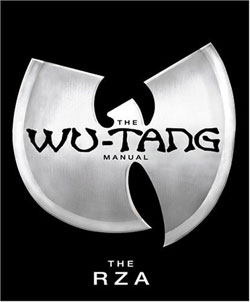The Wu-Tang Manual
The Wu-Tang Manual is a comprehensive guide to the philosophy, history, and wisdom of the Wu-Tang Clan, a seminal hip hop group that emerged from Staten Island, New York in the early 1990s. Authored by RZA, the de facto leader of the group, the manual delves into the intricate world of the Wu-Tang Clan, offering insights into their unique blend of music, spirituality, and life philosophy. It serves not only as a chronicle of the group's journey and achievements but also as a source of inspiration and knowledge for fans and readers interested in the deeper aspects of hip hop culture.
Content Overview[edit | edit source]
The Wu-Tang Manual is divided into four books, each focusing on different aspects of the Wu-Tang universe:
- Book One: Introduction to the Wu-Tang Clan, covering the history, foundation, and members of the group. It provides a detailed account of how the group was formed, their influences, and the significance of their debut album, "Enter the Wu-Tang (36 Chambers)."
- Book Two: Focuses on the philosophy and wisdom behind the music. This section delves into the Eastern philosophies, particularly Shaolin Kung Fu and the teachings of the Tao Te Ching, that have significantly influenced the group's ethos and lyrics.
- Book Three: Examines the business side of the Wu-Tang Clan, including the innovative approach to music production, copyright, and the establishment of the Wu-Tang brand. It offers insights into the group's decision to allow its members to pursue solo careers while maintaining the cohesion of the collective.
- Book Four: Provides an in-depth look at the lyrical content, meanings, and stories behind some of the Wu-Tang Clan's most iconic songs and albums. It also includes RZA's thoughts on the state of hip hop and its future.
Significance[edit | edit source]
The Wu-Tang Manual is more than just a book about a hip hop group; it is a cultural artifact that encapsulates the essence of the Wu-Tang Clan's impact on music, culture, and philosophy. The manual has been praised for its candidness, depth, and the unique perspective it offers on the intersection of music and spirituality. It is considered essential reading for fans of the Wu-Tang Clan and those interested in the broader cultural movements of the 1990s.
Reception[edit | edit source]
Upon its release, The Wu-Tang Manual received positive reviews for its comprehensive coverage and insightful analysis of the Wu-Tang Clan's work and philosophy. Critics and readers alike have lauded the book for its authenticity and the way it captures the spirit of the Wu-Tang Clan, making it a valuable resource for understanding the group's profound influence on hip hop and popular culture.
Legacy[edit | edit source]
The Wu-Tang Manual has contributed significantly to the documentation and preservation of hip hop history. It has educated readers about the complexities of the music industry, the art of lyricism, and the importance of maintaining integrity and authenticity in one's work. The manual continues to inspire new generations of artists, writers, and thinkers interested in the fusion of music, culture, and philosophy.
Search WikiMD
Ad.Tired of being Overweight? Try W8MD's physician weight loss program.
Semaglutide (Ozempic / Wegovy and Tirzepatide (Mounjaro / Zepbound) available.
Advertise on WikiMD
|
WikiMD's Wellness Encyclopedia |
| Let Food Be Thy Medicine Medicine Thy Food - Hippocrates |
Translate this page: - East Asian
中文,
日本,
한국어,
South Asian
हिन्दी,
தமிழ்,
తెలుగు,
Urdu,
ಕನ್ನಡ,
Southeast Asian
Indonesian,
Vietnamese,
Thai,
မြန်မာဘာသာ,
বাংলা
European
español,
Deutsch,
français,
Greek,
português do Brasil,
polski,
română,
русский,
Nederlands,
norsk,
svenska,
suomi,
Italian
Middle Eastern & African
عربى,
Turkish,
Persian,
Hebrew,
Afrikaans,
isiZulu,
Kiswahili,
Other
Bulgarian,
Hungarian,
Czech,
Swedish,
മലയാളം,
मराठी,
ਪੰਜਾਬੀ,
ગુજરાતી,
Portuguese,
Ukrainian
Medical Disclaimer: WikiMD is not a substitute for professional medical advice. The information on WikiMD is provided as an information resource only, may be incorrect, outdated or misleading, and is not to be used or relied on for any diagnostic or treatment purposes. Please consult your health care provider before making any healthcare decisions or for guidance about a specific medical condition. WikiMD expressly disclaims responsibility, and shall have no liability, for any damages, loss, injury, or liability whatsoever suffered as a result of your reliance on the information contained in this site. By visiting this site you agree to the foregoing terms and conditions, which may from time to time be changed or supplemented by WikiMD. If you do not agree to the foregoing terms and conditions, you should not enter or use this site. See full disclaimer.
Credits:Most images are courtesy of Wikimedia commons, and templates Wikipedia, licensed under CC BY SA or similar.
Contributors: Prab R. Tumpati, MD

